Despite attempts by the police to retake the legislative chamber yesterday, hundreds of demonstrators — mainly student activists — continued the occupation they began late on Tuesday night to protest the cross-strait trade pact, while thousands more outside the Legislative Yuan kept the building under siege.
“Reject the service trade pact! Reopen the negotiations! Defend our democracy!” about 2,500 protesters — within and outside the legislative chamber — chanted during the day.
The occupation began about 9pm on Tuesday, when more than 200 protesters at a rally being held outside the legislature against the trade pact suddenly climbed over the fences and entered the legislative complex.
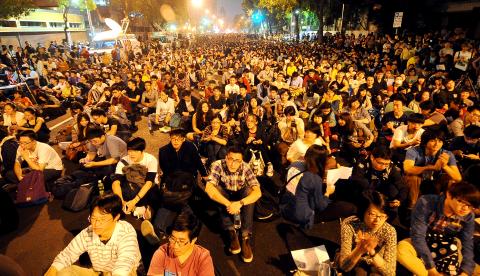
Photo: Taipei Times
They quickly took over the legislative chamber on the ground floor, as well as the second floor of the building, blocking entrances with piles of chairs in an effort to keep out the police.
Hundreds more people arrived outside the Legislative Yuan from about 3:40am in a show of support for the initial protesters. Chanting slogans, the latecomers pushed down a metal gate to enter the complex, but were stopped by police from going into the legislative chamber.
Some had brought ladders to climb into the building through second-floor windows, while others rallied in the parking lot outside the building.
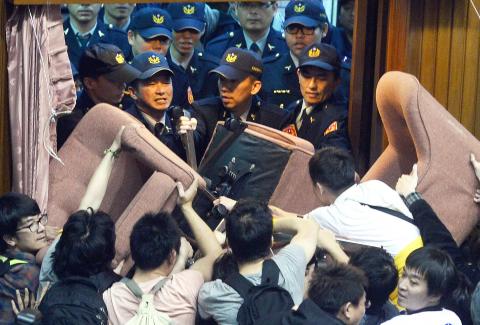
Photo: Wang Yi-sung, Taipei Times
The police made several attempts to break into the legislative chamber, but in vain, as the protesters inside resisted strongly, while those outside the chamber pulled officers away.
During one of the confrontations, police officer Chung Chen-chiang (鍾振強), who suffers from asthma, fainted and was rushed to National Taiwan University Hospital.
More people joined in support of the protesters yesterday morning, with many traveling from central and southern Taiwan, raising the number of demonstrators to more than 2,000, according to official estimates.
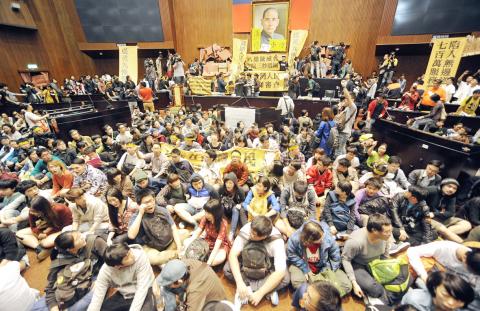
Photo: Liu Hsin-de, Taipei Times
“We estimate that there are more than 2,200 protesters inside and outside of the Legislative Yuan, and we have deployed about 2,000 officers on the scene,” National Police Agency Director-General Wang Cho-chiun (王卓鈞) said as he paid a visit to Chung at the hospital. “So far, 38 officers have been injured and we have arrested four student protesters.”
Lin Fei-fan (林飛帆), a National Taiwan University student and one of the protest leaders, thanked the public for their support.
“Since our plan is to stay here [in the legislative chamber] until Friday, the first thing we did after getting here was to secure a supply channel,” Lin said.
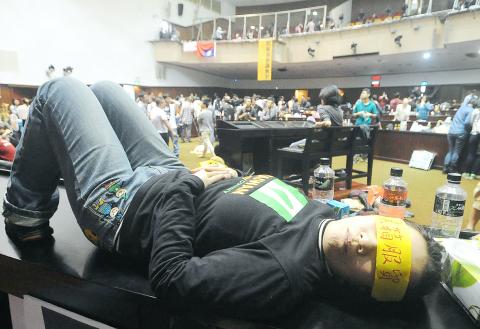
Photo: Liao Chen-huei, Taipei Times
“We are thankful that a lot of supplies — food, water and other necessities — are flowing in non-stop. This shows that the public is upset with the government and that we have the support of the people,” Lin said.
Activists also hung national flags upside down outside the building to express their dissatisfaction with the government’s handling of the trade agreement.
Many people showed their support for the protesters by ordering boxes of snacks online to be delivered to the legislative chamber. One unidentified person ordered NT$10,000 worth of bread to be delivered.
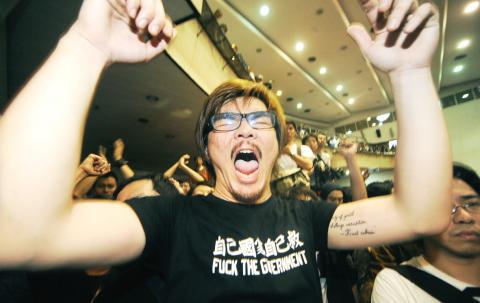
Photo: Liu Hsin-de, Taipei Times
A number of celebrities, including singer-songwriters Chen Ming-chang (陳明章) and Deserts Chang (張懸), actor Huang Ho (黃河) and entertainer Cheng Chia-chen (鄭佳甄) — who is better known by her nickname “Chicken Cutlet Girl” (雞排妹) — showed up during the day to voice their support for the protest.
The crowd was excited and sang along when Chen led them to sing his hit song Wandering to Tamsui (流浪到淡水).
A number of foreign residents also joined in, including Vietnamese immigrant Lu Viet Hung.
“I am here to protest that the government is trying to pass the pact without the consent of the Taiwanese,” Lu said. “I would like to call on everyone to urge more friends to come out, as this may be a crisis for Taiwan’s democracy.”
While the protest remained mostly peaceful, one girl cut her wrist and used her blood to draw a heart on the wall in the legislature.
She did not give her name to reporters or explain what she was trying to say, and was quickly taken away to the health center.
At the beginning of the occupation, the police tried to force the activists out of the legislative chamber by closing the toilets and turning off the air-conditioning system, but the toilets were reopened early in the morning, and the air-conditioning was turned back on shortly after 10am, after protesters outside the chamber threatened to break in if Legislative Yuan officials did not restore the air-conditioning.
The occupation of the legislative chamber and the siege outside were continuing as of press time.

NATIONAL SECURITY THREAT: An official said that Guan Guan’s comments had gone beyond the threshold of free speech, as she advocated for the destruction of the ROC China-born media influencer Guan Guan’s (關關) residency permit has been revoked for repeatedly posting pro-China content that threatens national security, the National Immigration Agency said yesterday. Guan Guan has said many controversial things in her videos posted to Douyin (抖音), including “the red flag will soon be painted all over Taiwan” and “Taiwan is an inseparable part of China,” while expressing hope for expedited “reunification.” The agency received multiple reports alleging that Guan Guan had advocated for armed reunification last year. After investigating, the agency last month issued a notice requiring her to appear and account for her actions. Guan Guan appeared as required,

Japan and the Philippines yesterday signed a defense pact that would allow the tax-free provision of ammunition, fuel, food and other necessities when their forces stage joint training to boost deterrence against China’s growing aggression in the region and to bolster their preparation for natural disasters. Japan has faced increasing political, trade and security tensions with China, which was angered by Japanese Prime Minister Sanae Takaichi’s remark that a Chinese attack on Taiwan would be a survival-threatening situation for Japan, triggering a military response. Japan and the Philippines have also had separate territorial conflicts with Beijing in the East and South China

A strong cold air mass is expected to arrive tonight, bringing a change in weather and a drop in temperature, the Central Weather Administration (CWA) said. The coldest time would be early on Thursday morning, with temperatures in some areas dipping as low as 8°C, it said. Daytime highs yesterday were 22°C to 24°C in northern and eastern Taiwan, and about 25°C to 28°C in the central and southern regions, it said. However, nighttime lows would dip to about 15°C to 16°C in central and northern Taiwan as well as the northeast, and 17°C to 19°C elsewhere, it said. Tropical Storm Nokaen, currently

PAPERS, PLEASE: The gang exploited the high value of the passports, selling them at inflated prices to Chinese buyers, who would treat them as ‘invisibility cloaks’ The Yilan District Court has handed four members of a syndicate prison terms ranging from one year and two months to two years and two months for their involvement in a scheme to purchase Taiwanese passports and resell them abroad at a massive markup. A Chinese human smuggling syndicate purchased Taiwanese passports through local criminal networks, exploiting the passports’ visa-free travel privileges to turn a profit of more than 20 times the original price, the court said. Such criminal organizations enable people to impersonate Taiwanese when entering and exiting Taiwan and other countries, undermining social order and the credibility of the nation’s